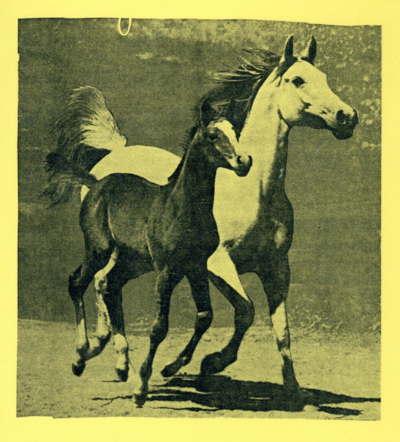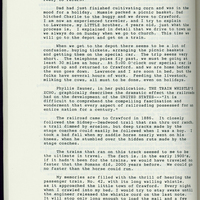056
Item
-
Title
-
056
-
Transcription
-
The North Western Railroad would often add a passenger car to a freight train and take it as far as Glenn, a small park and recreational area, and leave it until the passengers were ready to return.
Dad had just finished cultivating corn and was in the mood for a holiday. Mumsie packed a picnic basket, Dad hitched Charlie to the buggy and we drove to Crawford. I am now an experienced traveler, and I try to explain to Lawrence, my LITTLE brother, 4 years old, just what the process is, I explained in detail that we drive to town as we always do on Sunday when we go to church. This time we will go to the depot and get on a train.
When we get to the depot there seems to be a lot of confusion, buying tickets, arranging the picnic baskets and getting them on the special car. The trip seems very short. The telephone poles fly past, we must be going at least 30 miles an hour. At 5:00 O'clock our special car is picked up and returned to Crawford. [sic] and we are home before the sun goes down. Lawrence and I are soon in bed, but the folks have several hours of work. Feeding the livestock, milking the cows, all must to be done, even on holidays.
Phyllis Zauner, in her publication, THE TRAIN WHISTLE'S ECHO, graphically describes the dramatic effect the railroad had on the development of the UNITED STATES---"It is difficult to comprehend the compelling fascination and wonderment that every aspect of railroading possessed for an entire nation for a century."
The railroad came to Crawford in 1886. It closely followed the Sidney--Deadwood trail that ran thru our ranch, a trail dimmed by erosion, but deep tracks made by the stage coaches could easily be followed when I was a boy. I took a bad fall when my saddle horse nearly went on his knees, when he stumbled over the hidden ruts made by the stage coaches.
The trains that ran on this track seemed to me to be the ultimate in travel. The fact is, in the early 1900's, if it hadn't been for the trains, we would have traveled no faster that the Romans did, 2000 years before. We could go no faster than the horse could run.
My memories are filled with the thrill of hearing the passenger train, No. 42, with its long wailing whistle, as it approached the little town of Crawford. Every night when I crawled into my bed, I would try to stay awake until the engineer released the whistle cord on the last note. It will stop only long enough to load the mail and a few passengers, before it labors over Pine Ridge and settles down to a dreary night run thru the Sand Hills to Lincoln [sic] Nebraska.
-
Rights
-
To inquire about usage, please contact Archives & Special Collections, University of Nebraska-Lincoln Libraries. These images are for educational use only. Not all images are available for publication.
 Metzger Memories
Metzger Memories
 Metzger Memories
Metzger Memories
